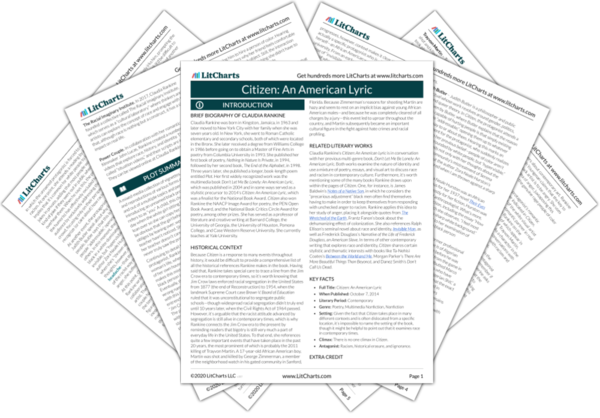The Speaker Quotes in Citizen: An American Lyric
Youngman's suggestions are meant to expose expectations for blackness as well as to underscore the difficulty inherent in any attempt by black artists to metabolize real rage. The commodified anger his video advocates rests lightly on the surface for spectacle's sake. It can be engaged or played like the race card and is tied solely to the performance of blackness and not to the emotional state of particular individuals in particular situations.
On the bridge between this sellable anger and "the artist" resides, at times, an actual anger. Youngman in his video doesn't address this type of anger: the anger built up through experience and the quotidian struggles against dehumanization every brown or black person lives simply because of skin color. This other kind of anger in time can prevent, rather than sponsor, the production of anything except loneliness.

Unlock explanations and citation info for this and every other Citizen: An American Lyric quote.
Plus so much more...
Get LitCharts A+The past is a life sentence, a blunt instrument aimed at tomorrow.
Drag that first person out of the social death of history, then we're kin.
Boys will be boys being boys feeling their capacity heaving butting heads righting their wrongs in the violence of aggravated adolescence charging forward in their way experiencing the position of positioning which is a position for only one kind of boy face it know it for the other boy for the other boys the fists the feet criminalized already are weapons already exploding the landscape and then the litigious hitting back is life imprisoned.
Yesterday, I begin, I was waiting in the car for time to pass. A woman pulled in and started to park her car facing mine. Our eyes met and what passed passed as quickly as the look away. She backed up and parked on the other side of the lot. I could have followed her to worry my question but I had to go, I was expected on court, I grabbed my racket.
[…]
Did you win? he asks.
It wasn't a match, I say. It was a lesson.

The Speaker Quotes in Citizen: An American Lyric
Youngman's suggestions are meant to expose expectations for blackness as well as to underscore the difficulty inherent in any attempt by black artists to metabolize real rage. The commodified anger his video advocates rests lightly on the surface for spectacle's sake. It can be engaged or played like the race card and is tied solely to the performance of blackness and not to the emotional state of particular individuals in particular situations.
On the bridge between this sellable anger and "the artist" resides, at times, an actual anger. Youngman in his video doesn't address this type of anger: the anger built up through experience and the quotidian struggles against dehumanization every brown or black person lives simply because of skin color. This other kind of anger in time can prevent, rather than sponsor, the production of anything except loneliness.

Unlock explanations and citation info for this and every other Citizen: An American Lyric quote.
Plus so much more...
Get LitCharts A+The past is a life sentence, a blunt instrument aimed at tomorrow.
Drag that first person out of the social death of history, then we're kin.
Boys will be boys being boys feeling their capacity heaving butting heads righting their wrongs in the violence of aggravated adolescence charging forward in their way experiencing the position of positioning which is a position for only one kind of boy face it know it for the other boy for the other boys the fists the feet criminalized already are weapons already exploding the landscape and then the litigious hitting back is life imprisoned.
Yesterday, I begin, I was waiting in the car for time to pass. A woman pulled in and started to park her car facing mine. Our eyes met and what passed passed as quickly as the look away. She backed up and parked on the other side of the lot. I could have followed her to worry my question but I had to go, I was expected on court, I grabbed my racket.
[…]
Did you win? he asks.
It wasn't a match, I say. It was a lesson.











